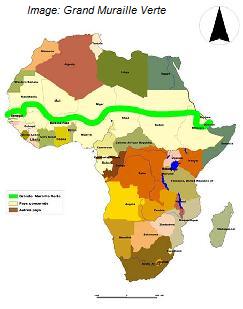The United Nations Food and Agriculture Organisation (FAO) says that degradation of about two billion of hectares of arable land is due to population pressures in 64 of 105 countries. The United Nations Economic Commission for Africa (UNECA) says 11 states in Northern Nigeria (Adamawa, Bauchi, Borno, Gombe and Yobe states in the northeast Nigeria and Jigawa, Kano, Katsina, Kebbi, Sokoto and Zamfara in the northwest) are threatened by desertification. Studies by the International Institute of Tropical Agriculture (IITA), Ibadan show that the rate of deforestation in Nigeria is about 3.5 percent, translating to a loss of between 350,000 and 400,000 hectares of forest land per year.
 One of the greatest challenges in human history is before us. It is desertification, which has brought decline in biodiversity, with consequences on economic productivity of the affected lands.
One of the greatest challenges in human history is before us. It is desertification, which has brought decline in biodiversity, with consequences on economic productivity of the affected lands.
The statistics of desertification in Africa is alarming, especially in the Sahara/Sahel regions where the sand has become an enemy that is being feared. The creeping desertification is causing droughts. Food security is threatened by the intruding sands.
It is on record that about 43 percent of Nigeria’s total land area is under the threat of desertification with the resultant deleterious effect on food security, sustainable livelihoods and social security of the affected communities of over 40 million people.
Of the total of 19 states that compose northern Nigeria, 11 are hit by desertification. This reasoning gave vent for Nigeria to propose the Great Green Wall for the Sahara and the Sahel Initiative (GGWSSI).
It is a Pan-African; adopted by the African Union in 2007 when it also adopted Declaration 137 VIII, which approved the decision on the implementation of the Green Wall for the Sahara Initiative.
In Nigeria, the National Agency for the Great Green Wall (NAGGW) is the domestication of the GGWSSI, a Multilateral Environmental Agreements (MEAs) signed by Burkina Faso, Chad, Djibouti, Eritrea, Ethiopia, Mali, Mauritania, Niger, Nigeria, Senegal and Sudan at a convention in Ndjamena, Chad in June 2010 to create the Great Green Wall (GGW) agency.
Nigeria’s GGW strengthens the need for the country’s enrollment of all MEAs. Only this will lead to on-the-hand delivery that would control desert encroachment and other climate-related challenges.
The vision of the GGW is to combat ecological degradation, which in turn would tackle poverty. Over the years, climate variability, frequent droughts, poor management of land and water resources have caused rivers and lakes to dry up and contribute to degradation of soils in the Sahel-Saharan region.
Victor Ndoma-Egba, a former Senate leader, who sponsored the bill that became a law establishing the NAGGW to implement the Great Green Wall programme in Nigeria, said, “The specific goal of the Initiative is to address land degradation and desertification in the Sahara and Sahel region, enhance food security and support communities to adapt to climate change.”
One of the human causes of desertification is deforestation. And, according to FAO, Nigeria has the highest rate of deforestation in the world. Between 1990 and 2005, Nigeria lost a total of 35.7 percent of its forest cover, translating to 6,145,000 hectares.
Nigeria must therefore use all available MEAs in the fight against desertification. This is especially because funding for most projects that are based on international conventions on the environment, are available.
According to the Chief Executive Officer (CEO) of the Global Enrivonment Facility) GEF), Monique Barbut, GEF is determined to fund specific projects that bear on international conventions on the environment.
“The projects funded by the GEF fall within the purview of strategies that reflect the thrust of international conventions on the environment,” he stated.
In addition, Nigeria should lead all African countries that have the problems of desertification in the fight against this phenomenon. The country should implement all other international protocols bordering on environment in order to check the menace of desertification.
By Abdallah el-Kurebe
